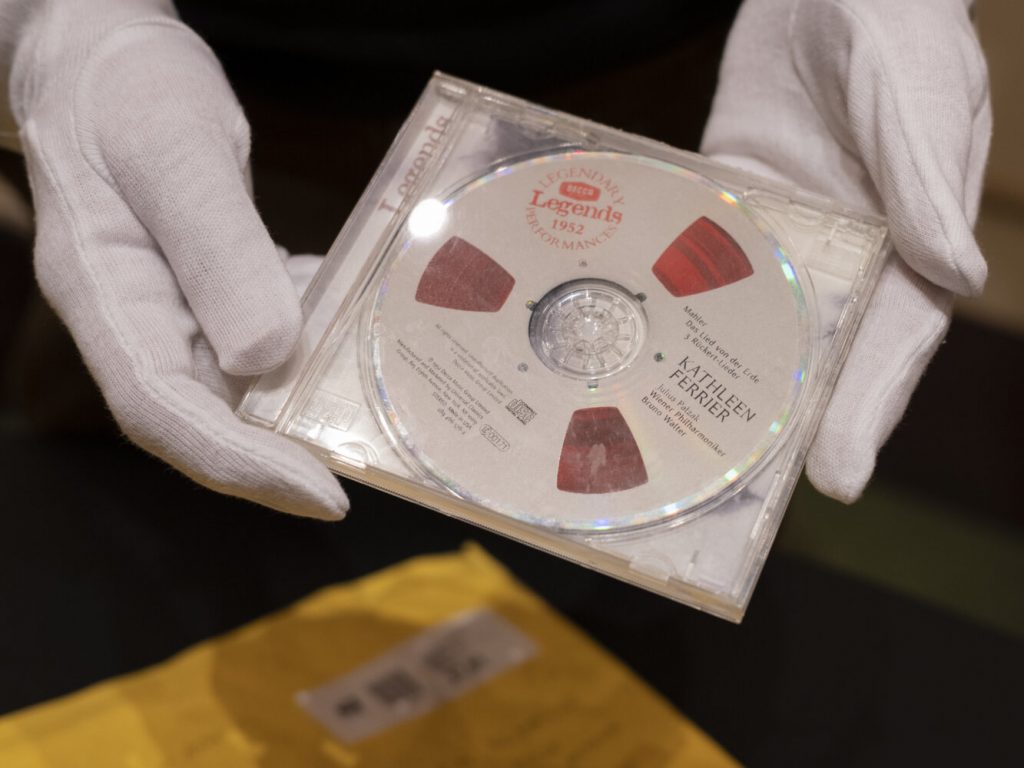
Opening of a gift from Louise Glück to the Nobel Prize Museum. © Nobel Prize Outreach. Photo: Niklas Elmehed
Louise Glück’s tenth collection of poems, ‘Averno’, was published in 2006. The record that she has donated to the museum is Mahler’s ‘Das Lied von der Erde’ (The Song of the Earth), featuring contralto Kathleen Ferrier and the Vienna Symphony Orchestra conducted by Bruno Walter. In her cover letter to the museum, Louise Glück writes:
“During the four years in which AVERNO was written, this is what I listened to. A few readers who knew nothing of my writerly habits heard Mahler, especially in ‘October’ …”
Music is a source of inspiration for many Nobel Prize laureates. Albert Einstein often described how important his own music-making was to him. Boris Pasternak and Elfriede Jelinek both studied music, and poets such as Wisława Szymborska and Tomas Tranströmer returned to music in their poems. Texts have also turned into music. Harry Martinson’s epic science fiction poem ‘Aniara’ became an opera, with music by Karl-Birger Blomdahl, and Kazuo Ishiguro has written lyrics for jazz singer Stacey Kent. And of course there is Bob Dylan, whose poetry and music merge completely.
In her letter to the museum, Louise Glück also describes the relationship between music and her writing:
“… the writing of a book has been preceded (often by several years) by obsessive listening to a particular piece of music. I say the writing of a book as though that were a matter of steady application toward a calculated end. But in my experience, writing is erratic, a kind of possessed fluency alternating with a steady silence. Only the music is both inspired and steady; it seems to me my poems emerge from it.”
When laureates visit the Nobel Prize Museum in Stockholm’s Old Town, they are always asked to bring an artefact that has meant something special to them. It may be an artefact that tells about who they are, or that has a connection to the achievements for which they have been rewarded. Louise Glück was unable to attend the 2022 Nobel Week in Stockholm, which is why she posted an artefact to the museum instead.
The museum’s collection already includes such artefacts as a handwritten manuscript from Albert Einstein and the shawl that Malala Yousafzai wore when she gave a speech to the UN General Assembly.
“Snow had fallen. I remember
music from an open window.
Come to me, said the world.
This is not to say
it spoke in exact sentences
but that I perceived beauty in this manner.”
Part of the poem ‘October’, from the collection ‘Averno’.
For further information, please contact:
Rebecka Oxelström, Head of Press, rebecka.oxelstrom@nobelprize.org
For press images, click here.
Nobel Prize Museum
The Nobel Prize shows that ideas can change the world. The courage, creativity and perseverance of the Nobel Prize laureates inspire us and give us hope for the future. Films, in-depth tours, and artefacts tell the stories of the laureates and their contributions “for the greatest benefit to humankind”. Based on the Nobel Prize’s unique combination of fields – natural sciences, literature and peace – we examine the greatest challenges of our time and show how we can respond to them through science, humanism and collaboration. With our exhibitions, school programmes, lectures and conversations, we at the Nobel Prize Museum strive to engage the public in making a better world. Today we are located on Stortorget, the main square in Gamla Stan, Stockholm’s Old Town district. We are planning to create a new home for our public outreach activities at Slussen in central Stockholm.
Disclaimer: The Nobel Prize Museum is not directly or indirectly involved in the process of nominating or selecting Nobel Prize laureates. These procedures are strictly confidential and regulated by the Nobel Prize awarding institutions.
© Nobel Prize Museum 2023. Nobelpriset®, Nobel Prize® and the Nobel Prize medal are registered trademarks of the Nobel Foundation.